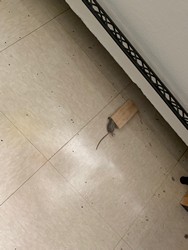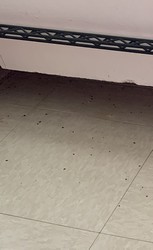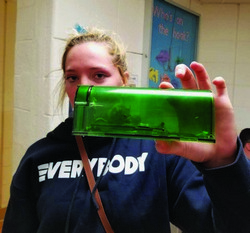There continues to be sightings of rodents in Elmwood Hall, one week after a video of residents encountering a dead mouse widely circulated on Instagram, with more than 9,800 views, on Friday, Feb.1.
According to Patti Swannack, Vice President for Administrative Services, the first Elmwood report of mice in 2019 occurred on the first day of the spring semester, Jan. 22, when students in a third-floor room noticed that their power bars had been eaten.
After another sighting was reported on the first floor several days later, Residential Life requested that exterminators treat that area, as well as sections of Elmwood Hall where mice had been spotted during the previous semester.
The last treatment occurred on Tuesday, Feb. 5, and Swannack warned that the mouse bait placed by exterminators would take a little time to work. “I am frustrated because we have never had this kind of a problem in a residence hall,” Swannack admitted. “We will continue to do everything we can to mitigate this problem.”
Swannack added that Shadows Club was treated by exterminators on Friday and they plan to continue sending treatment teams to Elmwood.
As of Saturday night, Feb. 9, Residential Life has not responded to a question over whether residents will be temporarily moved from Elmwood Hall until the mice infestation can be dealt with more effectively.
Ilya Kirejevas, a freshman psychology student and Elmwood resident, said that he hopes that he will not have to change rooms, adding that he is frustrated with having to live in the current situation.“You can hear the mice at night,” he said. “They are scurrying up on the ceiling.”
 Despite efforts from the University’s Residential Life staff to ensure that Elmwood Hall would be free of mice, a small crowd of students gathered in Elmwood’s lobby Friday night, Feb. 8, to view the latest mouse that residents have caught on their own.
Despite efforts from the University’s Residential Life staff to ensure that Elmwood Hall would be free of mice, a small crowd of students gathered in Elmwood’s lobby Friday night, Feb. 8, to view the latest mouse that residents have caught on their own.
“Residents have been buying their own traps,” said one Resident Assistant, speaking on condition of anonymity. “Resident Life thinks the problem is taken care of, but it obviously is not.”
Swannack said that the University has an annual contract with an exterminator that requires they be on campus at least two days a week and would respond to requests for additional services. However, she acknowledged that treatment can be difficult if residents leave food, clothes, and other personal items on the floor, while pointing out that the cold weather may cause mice to seek shelter indoors.
Another unnamed resident of Elmwood Hall said they have seen mice run across the floor from the garbage room several times the previous week. They pointed to a hole in a supply room, located next to the garbage room, as a possible source of entry for the rodents.
According to the Centers for Disease Control, rodents can transmit a number of illnesses to people who come in contact with them, including Hantavirus Pulmonary Syndrome, a rare disease that is caused by breathing in dust that is contaminated with rodent urine or feces.
Landon Myers, an Elmwood Resident Assistant and senior political science student, said that reports of mice in Elmwood have significantly increased from a few sightings in the fall to many since the start of the spring semester, with residents having even been forced to kill the mice they have encountered through traps.
 “While Residential Life has worked on resolving the issue, many residents are infuriated with lack of communication from the higher ups in Residential Life and the University,” said Myers. “The sentiment within the building is, ‘Who wants to pay all this money for housing to then share it with rodents?’”
“While Residential Life has worked on resolving the issue, many residents are infuriated with lack of communication from the higher ups in Residential Life and the University,” said Myers. “The sentiment within the building is, ‘Who wants to pay all this money for housing to then share it with rodents?’”
However, Myers expressed concern about the underreporting of mice in Elmwood Hall, stating that it is difficult to determine the number of mice in the building and when the last sightings truly were.
“While some residents are concerned with the mice issue, others simply do not report seeing them as it became common, or instead will post videos of mice in the building to social media,” he said.
Elmwood Hall is among the oldest dormitories at the University and is one of just two housing buildings without an air-conditioning system. Earlier this year, due to a heat wave, the University set up cots on the third floor of the Student Center to accommodate residents who were suffering from the high temperatures.
Any sightings of rodents inside a housing building should be reported to Facilities Management through a work order request on the Monmouth University Portal. However, Swannack has said there are no immediate plans to temporarily close Elmwood Hall down. Instead, she encouraged individual students concerned about living in Elmwood to reach out to Residential Life about any options they might have.
PHOTO COURTESY of Taylor Coury
PHOTO COURTESY of Landon Myers




